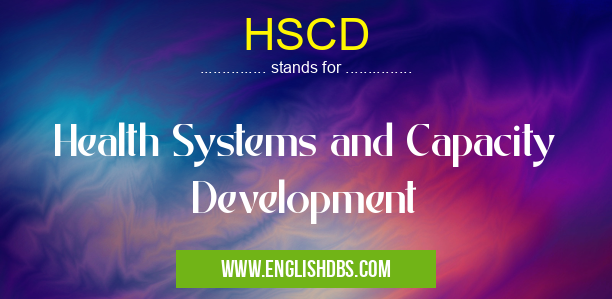What does HSCD mean in DEVELOPMENT
Health Systems and Capacity Development (HSCD) encompasses the processes and efforts aimed at strengthening the infrastructure, resources, and capabilities of healthcare systems to effectively deliver quality healthcare services to populations. HSCD plays a vital role in improving health outcomes, reducing health disparities, and ensuring sustainable health systems.

HSCD meaning in Development in Community
HSCD mostly used in an acronym Development in Category Community that means Health Systems and Capacity Development
Shorthand: HSCD,
Full Form: Health Systems and Capacity Development
For more information of "Health Systems and Capacity Development", see the section below.
» Community » Development
Key Points
-
HSCD involves a holistic approach that addresses various aspects of healthcare systems, including:
- Infrastructure development and maintenance
- Human resource development and training
- Information systems and data management
- Financing and resource mobilization
- Policy and governance frameworks
-
The primary goal of HSCD is to enhance the capacity of healthcare systems to:
- Prevent and treat diseases effectively
- Promote health and well-being
- Respond to health emergencies
- Deliver equitable and accessible healthcare services
-
HSCD interventions can include:
- Building and renovating healthcare facilities
- Training healthcare personnel
- Establishing and strengthening health information systems
- Implementing innovative financing mechanisms
- Developing and enforcing health policies
-
Effective HSCD requires collaborative efforts among governments, healthcare providers, international organizations, and communities.
Essential Questions and Answers on Health Systems and Capacity Development in "COMMUNITY»DEVELOPMENT"
What is Health Systems and Capacity Development (HSCD)?
HSCD is a field that focuses on improving the performance and capabilities of health systems. It involves a wide range of activities, including strengthening health infrastructure, training health workers, and developing health policies. The ultimate goal of HSCD is to ensure that everyone has access to quality health services.
Why is HSCD important?
HSCD is important because it helps to improve the overall health of populations. By strengthening health systems, we can prevent disease, treat illness, and promote healthy behaviors. HSCD also helps to reduce health disparities and ensure that everyone has access to the care they need.
What are some of the key components of HSCD?
Some of the key components of HSCD include:
- Health infrastructure: This refers to the physical facilities and equipment that are needed to provide health services.
- Health workforce: This refers to the doctors, nurses, and other health workers who provide care.
- Health policies: These are the laws and regulations that govern the health system.
- Health financing: This refers to the way that health services are paid for.
How can HSCD be improved?
There are a number of ways to improve HSCD. Some of the most important include:
- Investing in health infrastructure: This means building new hospitals and clinics, and upgrading existing ones.
- Training health workers: This means providing health workers with the skills and knowledge they need to provide quality care.
- Developing health policies: This means creating laws and regulations that support a strong health system.
- Increasing health financing: This means finding ways to pay for health services so that everyone can access them.
Final Words: HSCD is crucial for building resilient and sustainable healthcare systems that can meet the evolving health needs of populations. By investing in HSCD, countries and organizations can improve health outcomes, reduce healthcare costs, and promote social and economic development.
